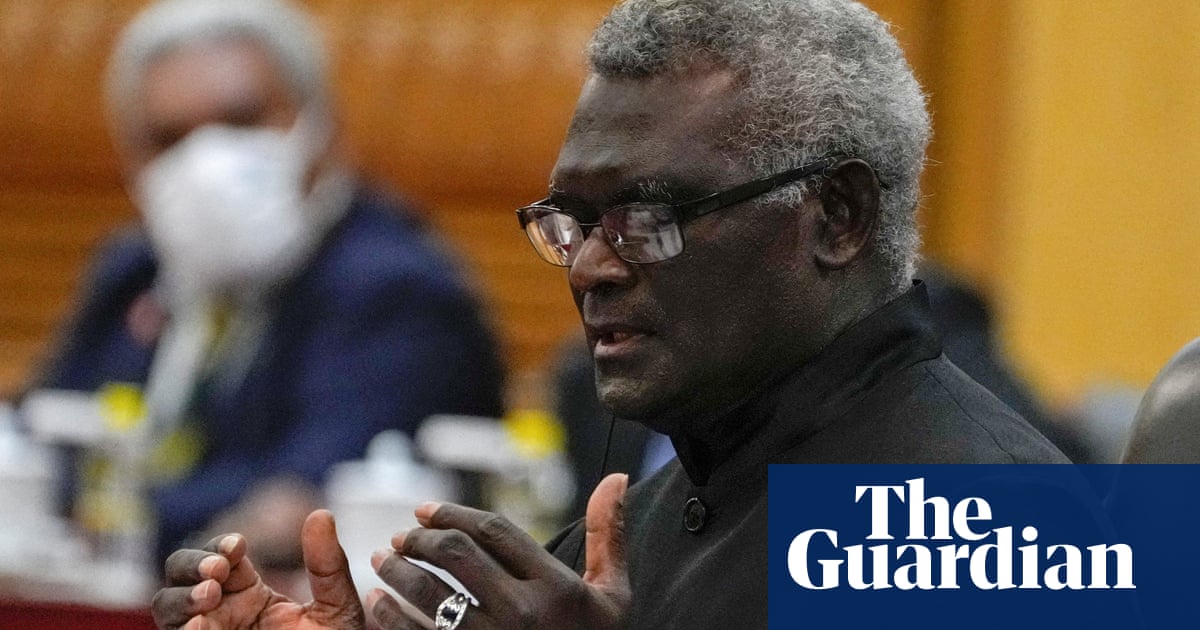


As Manasseh Sogavare, the most outwardly China-friendly leader of a Pacific island country, conceded his time as prime minister of Solomon Islands was up, he didn’t appear to be quite ready to forgive and forget.
Announcing his departure in a post-election press conference on Monday, Sogavare lamented that his government had come “under pressure from the United States and western allies” and had been “accused of many things”.
Sogavare maintained that his decision to switch Solomon Islands’ diplomatic recognition from Taiwan to Beijing in 2019 had been “very important”, despite the intense geopolitical tussle that followed.
In the Pacific, Solomon Islands is by no means alone in pursuing deeper diplomatic and economic ties with China. Countries in the region have no appetite to be seen as pawns in a chess game between the major powers, and instead view economic development and fighting the climate crisis as top priorities. The United States is widely seen to have dropped the ball in the Pacific in recent years and is now scrambling to regain influence.
Sogavare’s departure will probably come as a relief in western capitals, after he struck a far-reaching security agreement with Beijing in 2022 – causing shock waves in the Australian federal election campaign and alarming officials in Washington.
However his exit will not necessarily signal any significant change in Honiara’s international outlook. His potential successor, Jeremiah Manele, was foreign minister at the time the security deal with China was signed. Manele has vowed to continue Sogavare’s “friends to all and enemies to none” foreign policy – which in theory means avoiding picking a side in the geopolitical rivalry between the great powers, but in practice has seen a blossoming relationship with China.
The 2022 security agreement with China caused alarm in the foreign policy and military establishments in Australia and the US because it was broadly worded and seemed to symbolise a breakthrough in China’s outreach to the Pacific.
The text of the final agreement is still secret, but the leaked initial version would give China an avenue to “make ship visits to, carry out logistical replenishment in, and have stopover and transition in Solomon Islands”, while Chinese forces could “protect the safety of Chinese personnel and major projects in Solomon Islands”.
The fears were that the deal could be a stepping stone to a future Chinese naval base less than 2,000km from Australia’s east coast, although Sogavare always denied this. “We are not pressured in any way by our new friends and there is no intention whatsoever to ask China to build a military base in the Solomon Islands,” Sogavare said.
Sogavare dismissed foreign criticism of the country’s security negotiations with China, saying in one of his many fiery speeches to parliament: “We find it very insulting, Mr Speaker, to be branded as unfit to manage our sovereign affairs.”
The then Australian prime minister, Scott Morrison, only inflamed the rift by saying a Chinese military base would be a “red line” and by suggesting that Sogavare’s views were influenced by Beijing. After the Morrison government was defeated by Anthony Albanese’s Australian Labor party, Canberra made determined efforts to mend fences with Sogavare and restore standing with the rest of the Pacific.
The US also reopened an embassy in Solomon Islands last year after a 30-year absence, with the secretary of state, Antony Blinken, declaring that “the Indo-Pacific region – including the Pacific islands – will shape the world’s trajectory in the 21st century”.
In the face of this diplomatic outreach, Sogavare showed no sign of any second thoughts on his China pivot. He was feted on a trip to Beijing in July last year, joining with Xi Jinping to announce “a comprehensive strategic partnership”, including police training and exchanges.
China’s president hailed friendly ties with Solomon Islands as “a pacesetter for the relations between China and other island countries in the Pacific” – a signal that Beijing intends to continue its outreach in the region.
For his part, Sogavare pledged to oppose “any actions that contain or aim to contain China’s development”.
A few months later, Sogavare snubbed a White House summit between Joe Biden and Pacific leaders and said the US should stop “lecturing” the region’s governments.
Sogavare has been a polarising figure and “a lightning rod for international scrutiny”, explained Mihai Sora, a research fellow at the Sydney-based Lowy Institute and a former Australian diplomat in Solomon Islands.
Speaking to Reuters about post-election negotiations, Sora said parliamentarians in Solomon Islands “may have decided this time around that a less strident figure would have a better chance of being accepted by an already frustrated community and may reduce some of the recent tensions with international partners”.
Australia’s deputy prime minister, Richard Marles, was diplomatic on Tuesday when asked whether Sogavare’s departure would diminish China’s influence.
“It’s hard to answer that question without weighing in to Solomon Islands’ politics, which I’m not going to do,” Marles told Sky News Australia. “Whoever forms government … we will seek to be their partner of choice and we will work very hard to earn that trust.”
Additional reporting by Reuters